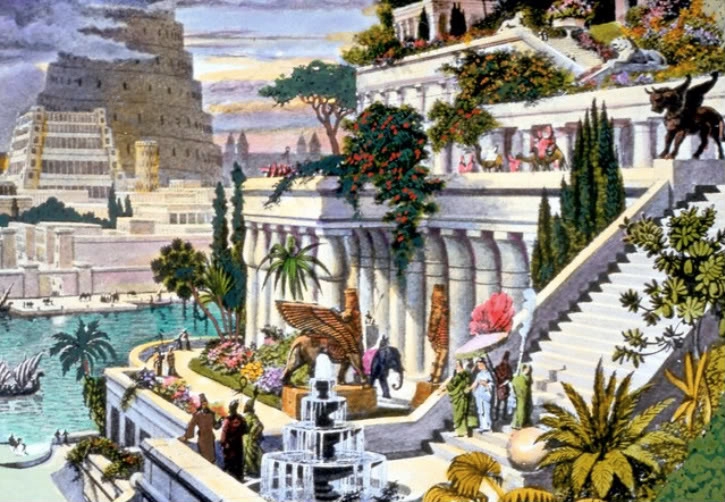Rivers of Babylon
바빌론 강가에서

세계 7대 불가사의 중의 하나인 '바빌론의 공중 정원'
This hand-coloured engraving, probably made in the 19th century after the first excavations in the Assyrian capitals,
depicts the fabled Hanging Gardens, with the Tower of Babel in the background.
https://en.wikipedia.org/wiki/Hanging_Gardens_of_Babylon
There is some controversy as to whether the Hanging Gardens(바빌론의 공중 정원) were
an actual creation or a poetic creation due to the lack of documentation of them
in the chronicles of Babylonian history.
Mm....ah....
By the rivers of Babylon there we sat down
Yeah we wept, when we remembered Zion
By the rivers of Babylon there we sat down
Yeah we wept, when we remembered Zion
음....아하....
바빌론의 강가에서 우린 앉아있었죠
우리들은 시온을 생각하며 눈물을 흘렸답니다
바빌론의 강가에서 우린 앉아있었죠
우리들은 시온을 생각하며 눈물을 흘렸답니다
When the wicked carried us away in captivity
required of us a song
Now, how shall we sing the Lord's song
in a strange land?
When the wicked carried us away in captivity
requiring of us a song
Now, how shall we sing the Lord's song
in a strange land?
침략자들이 우리를 끌고 와서 노래를 하래요
하지만 우리가 어떻게 이방의 땅에서 주님의 노래를 부를 수 있겠어요
우리를 포로로 잡아간 침략자들이 노래를 하랍니다
하지만 우리가 어떻게 주님의 노래를 이방인의 땅에서 부를 수 있겠냐구요
Ooo Ah-- Yeah,,,,
Let the words of our mouths and
the meditations of our hearts
Be acceptable in thy sight hear tonight.
Let the words of our mouths and
the meditations of our hearts
Be acceptable in thy sight hear tonight.
오우 아-- 에헤,,,,
우리가 하는 말과 마음의 소원하는 것들을 오늘밤도 들어 주옵소서
우리가 하는 말과 마음에 소원하는 것들을 오늘밤도 들어 주옵소서.
|
"바빌론 강가
"The Ricers of Babylon" is a Rastafarian song written and recorded by Brent Dowe and Trevor McNaughton of the Jamaican reggae group the Melodians in 1970. 1978년 Boney M.이 다시 히트시킨 '바빌론 강가에서'는 이렇게 시작된다. 경쾌하고 단순한 레게 리듬에 묵직한 주제를 담은 복음성가(CCM)는 구약성경에 나오는 역사적 사건에 근거하고 있다. '바빌론의 유수(幽囚)'로 알려진 유대인 포로 행렬이다.
|

http://www.flickr.com/photos/21730729@N05
https://www.biblegateway.com/passage/?search=Psalm%20137
Psalm 137
1, By the rivers of Babylon we sat and wept
when we remembered Zion.
2. There on the poplars
we hung our harps,
3. for there our captors asked us for songs,
our tormentors demanded songs of joy;
they said, “Sing us one of the songs of Zion!”
4. How can we sing the songs of the Lord
while in a foreign land?
5. If I forget you, Jerusalem,
may my right hand forget its skill.
6. May my tongue cling to the roof of my mouth
if I do not remember you,
if I do not consider Jerusalem
my highest joy.
7. Remember, Lord, what the Edomites did
on the day Jerusalem fell.
“Tear it down,” they cried,
“tear it down to its foundations!”
8. Daughter Babylon, doomed to destruction,
happy is the one who repays you
according to what you have done to us.
9. Happy is the one who seizes your infants
and dashes them against the rocks.
'아침정원 > Christian Music' 카테고리의 다른 글
| The Lord's Prayer(주기도문) (0) | 2017.11.10 |
|---|---|
| The Lord's Prayer(주기도문) (0) | 2017.10.06 |
| The Lord's Prayer(주기도문) (0) | 2017.08.03 |
| The Lord's Prayer (0) | 2017.07.06 |
| The Lord's Prayer _ Balboa Pier, Newport Beach, CA [Sat. June 24, 2017 - PDT] (0) | 2017.06.27 |